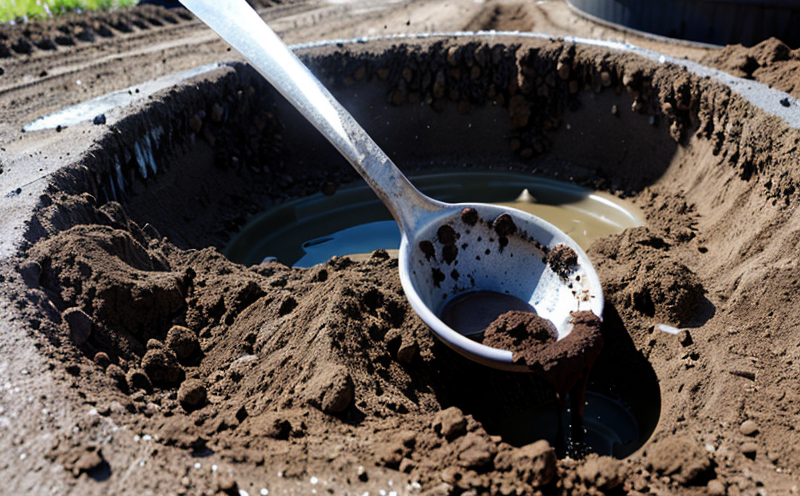EPA 1680 Fecal Coliform in Biosolids Test
The EPA Method 1680 is a comprehensive test designed to determine the presence and concentration of fecal coliform bacteria (Escherichia coli) within biosolids. This method plays a critical role in environmental protection, ensuring that waste materials used for land application meet stringent regulatory standards set by the United States Environmental Protection Agency (EPA).
The primary goal of this test is to safeguard public health and protect water resources from potential contamination. By measuring fecal coliform bacteria levels, regulators can assess whether biosolids pose a risk when applied to agricultural land or used in other environmental applications. Compliance with EPA Method 1680 helps facilities avoid costly penalties and enhances their reputation for responsible waste management practices.
The process involves several key steps: sampling the biosolid material, preparing it according to specified protocols, inoculating the sample onto appropriate media, incubating under controlled conditions, and finally, performing colony counts. The results provide actionable data that informs decisions about proper treatment processes needed before applying biosolids to agricultural fields or other designated sites.
The accuracy of this testing is paramount; therefore, strict adherence to established procedures ensures reliable outcomes. Properly conducted tests not only meet regulatory requirements but also contribute significantly towards maintaining sustainable practices within the wastewater industry. Understanding these nuances helps stakeholders appreciate why thorough laboratory analysis remains essential throughout the entire lifecycle of biosolid management.
In summary, EPA Method 1680 serves as a cornerstone for ensuring safe handling and utilization of biosolids, thereby promoting both environmental stewardship and public health protection.
Industry Applications
| Biosolid Type | Description |
|---|---|
| Class A | Biosolids that have been treated to achieve pathogen reduction and meet Class A requirements. |
| Class B | Biosolids not meeting Class A standards but intended for non-agricultural land application. |
| Agricultural Use | Biosolids applied directly to cropland, range, or pastures. |
| Land Application | Biosolids utilized in forestry practices or other similar activities. |
| Standard | Description |
|---|---|
| EPA Method 1680 | Determines the presence and concentration of fecal coliform bacteria in biosolids. |
| ASTM D5275-19 | Standard practice for sampling, collection, preparation, and analysis of municipal solid waste. |
| EN 12806:2018 | European standard specifying the determination of faecal coliforms in water by membrane filtration. |
The EPA 1680 Fecal Coliform test finds application across various industries involved with wastewater treatment and biosolid management. It ensures that all types of biosolids—from Class A to Class B—meet stringent pathogen reduction criteria before being used in agricultural or land-based applications.
Compliance with these standards is crucial for avoiding potential health risks associated with improper handling of waste materials. Regulatory bodies like the EPA enforce such measures to protect public safety and environmental integrity. By adhering to these guidelines, facilities can ensure their operations remain compliant while contributing positively towards sustainable resource use.
Eurolab Advantages
At Eurolab, we pride ourselves on offering unparalleled expertise in conducting the EPA 1680 Fecal Coliform test. Our state-of-the-art laboratory facilities equipped with cutting-edge technology allow us to deliver accurate and reliable results consistently. With years of experience behind every team member, our professionals bring deep knowledge about biosolid management processes and regulatory requirements.
Our commitment to quality extends beyond just technical proficiency; it encompasses a dedication to continuous improvement through rigorous training programs and staying abreast of latest developments in the field. This ensures that clients receive up-to-date insights into best practices for managing their biosolid resources effectively.
We understand that timely delivery is critical when dealing with regulatory deadlines. That's why we offer flexible scheduling options tailored specifically around your project timeline, ensuring minimal disruption to ongoing operations while still meeting all necessary requirements.
Moreover, Eurolab offers transparent communication throughout the entire testing process. Clients have access to regular updates via our secure online portal or through direct contact with assigned project managers. This level of engagement helps build trust and fosters a collaborative relationship between us and our valued customers.
In essence, choosing Eurolab means partnering with experts who understand your unique challenges and goals. Together, we can ensure that every aspect of the EPA 1680 Fecal Coliform test is carried out flawlessly, delivering results that exceed expectations.
Environmental and Sustainability Contributions
The EPA 1680 Fecal Coliform test plays a vital role in promoting environmental sustainability by ensuring proper management of biosolid resources. By adhering to strict regulatory standards, facilities can minimize the risk of pathogen transmission while maximizing beneficial reuse potential.
One significant contribution comes from reducing landfill waste volumes. Many municipalities generate large amounts of organic waste annually; converting this into valuable agricultural inputs through biosolids recycling programs reduces pressure on landfills and promotes closed-loop systems within communities.
Biosolid utilization also supports soil health by replenishing essential nutrients lost during crop production cycles. When applied correctly, these amendments improve soil structure, increase water retention capacity, and enhance overall fertility—all of which contribute to healthier ecosystems over time.
Furthermore, the practice encourages local economic development through job creation in related sectors such as agriculture and forestry. By fostering partnerships between wastewater treatment plants and farmers, communities can create mutually beneficial relationships that drive regional prosperity while protecting natural resources.
In conclusion, implementing EPA 1680 Fecal Coliform testing aligns closely with broader sustainability objectives by supporting responsible resource management strategies that benefit both current and future generations alike.





